7 May 2015 (Shubas Tavern, Chicago IL)
4.75/5.0




Fort Collins, CO has a decent music scene and I often make it down to Denver for shows. This time, though, I went a little further afield. My friend, Brent, invited me to Chicago to see Southern Culture on the Skids, and I couldn't say no. In a stroke of brilliant timing, I arrived for possibly the nicest two or three days Chicago has had since before the winter. The days were warm and clear and it was a pleasant evening walk from Brent and Lu's place to Shubas. The venue was relatively small, but SCOTS' enthusiastic fans made it a party evening. Great music, killer weather, and warm hospitality made this a wonderful vacation trip.
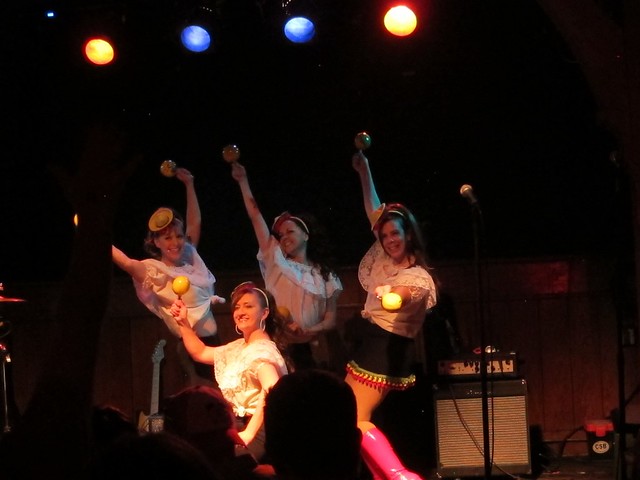
Finding the right opening act is always a challenge . Most bands are either thrown together by the venue or they partner up for a tour, but that doesn't always turn out well. Sometimes the problem is that the audience resents anyone that makes them wait for the headliner. Worse, the opener can foster the wrong mood and make it harder on the main act. Southern Culture on the Skids solved that problem handily by bringing in local go-go troupe The Revelettes as their cheerleading squad.
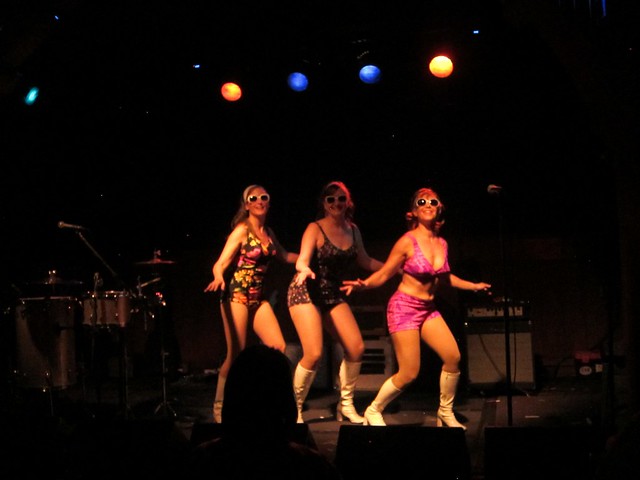
The show started with a pair of dancers shimmying in retro campy style accompanied by pre-recorded music. Then, the remaining three Revelettes tag teamed in for the next song. After a bit of choreographed fun, they got down to business. SCOTS has recently re- recorded their 1994 album "Ditch Digging" and the Revelettes brought up an audience member to help teach us all some dance moves for the title track. The volunteer picked up the steps quickly and soon fell directly into formation with the troupe. She had such a good time that she stayed on stage for the remaining songs.
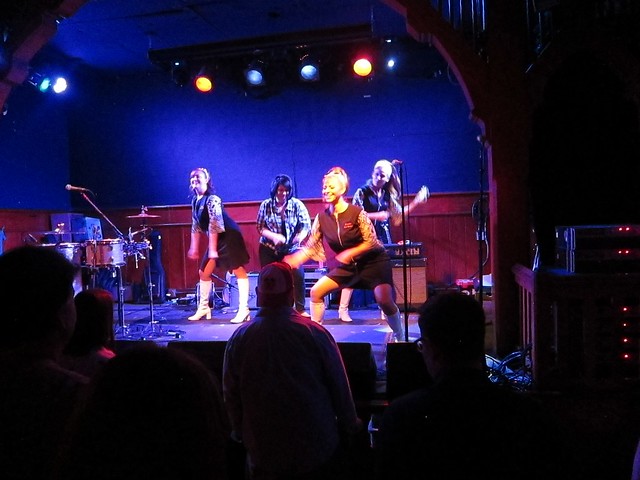
The fun vibe and enthusiastic dancing made this a perfect warm up for the band and, later, we'd get the chance to prove we remembered the "Ditch Diggin'" steps.
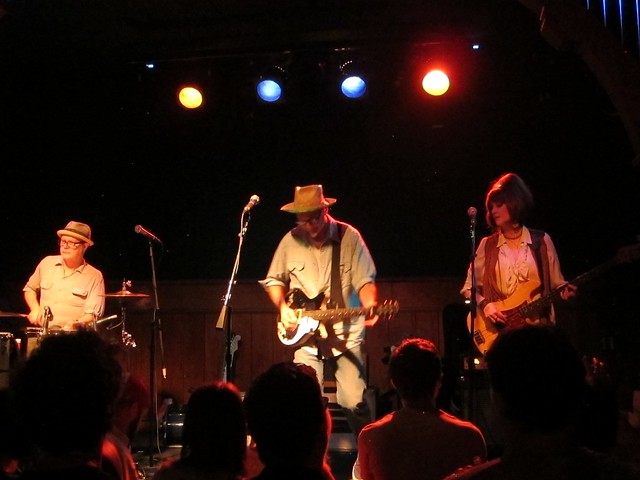
Southern Culture on the Skids had a casual start as bass player Mary Huff and guitarist Rick Miller sauntered out first and picked up their instruments. Huff briefly launched into Lynn Anderson's "(I Never Promised You A) Rose Garden", but it was just a tease before Dave Hartman came on stage on drums and the show officially began with the sharp-edged twang of "Skullbucket". Huff's solid bass vamp gave Miller all the foundation he needed to shred his way through the surf-style instrumental, and the crowd reveled in the bright distortion of his overdriven Silvertone.
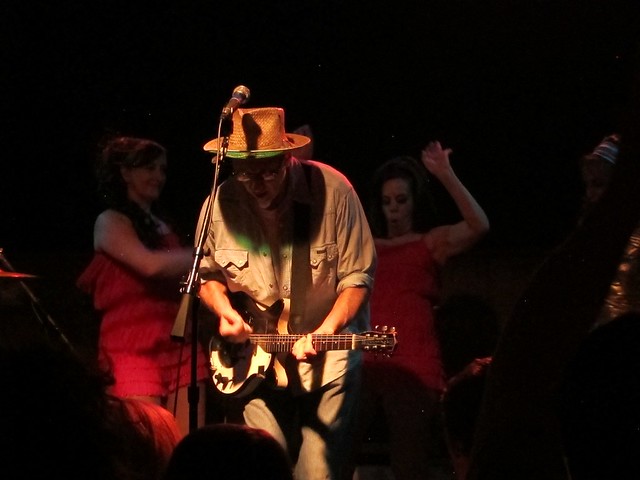
As the set progressed, I was struck by the communal feel between the band and their fans. They somehow bridged the relaxed celebration of a Southern pig roast and the congregational fervor of a faith healing service. Even as they tapped into a campy sense of fun, the trio imbued the songs with a respectful intensity. They smoothly flowed from surf to garage rock, chicken-picked pedal tones to thrashy punk rhythms, and bluesy vamps would give way to honkytonk country. The crowd tracked every twist and turn, intimately familiar with the songs, ready to sing along or feel the beat deep in their bones.
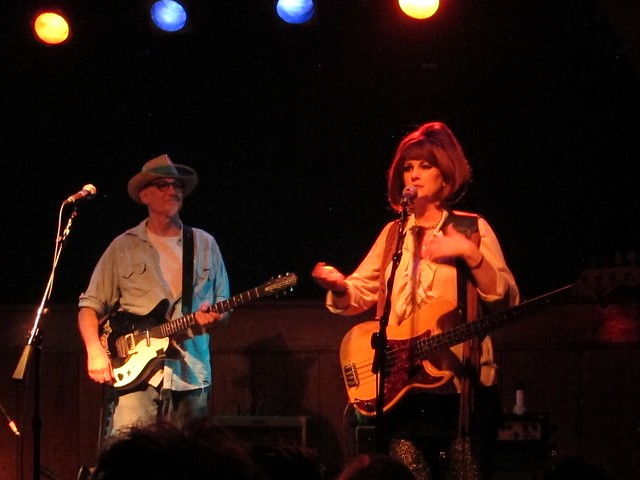
SCOTS' playful attitude was at the forefront, with the tongue-in-cheek Southern themes of the lyrics and the band's stage presence and appearance. They pulled out some of their classic audience participation moves: volunteers distributing oatmeal pies from the stage and launching fried chicken into the crowd during "8 Piece Box". It was fun to watch Miller get a mischievous twinkle in his eye before he launched into those songs whose title says it all, like "Liquored Up and Lacquered Down" or "Put Your Teeth Up On the Window Sill". And while his green visored fishing hat and Huff's bouffant wig may have played to some campy stereotypes, they wore them comfortably, with little sense of affectation.

But while we all laughed with them at the silliness and spectacle, it was clear that the band and the fans took this music seriously. Surf numbers like "Meximelt" locked into a psychedelic swirl, driven by Hartman's relentless tribal drum pounding while Miller intently channeled the legendary Dick Dale with a brambled wall of guitar notes. "Papa Was a Preacher, But Mama Was a Go-Go Girl" could have been a one-joke tune, but the honkytonk rhythm cradled Huff's twangy vocal, and it wasn't hard to think that there's a grain of truth in that: SCOTS understands the surety of the preacher, the physicality of the dancer, and the balance to love both equally.

After the show, the band wandered out to sign autographs and chat with the fans, many of whom had seen them the night before in Berwyn. Plenty of performers do the meet-and-greet ritual, but even here SCOTS distinguished themselves. Rather than rush people to clear through the lines, they took the time to connect with each one. They'd humbly deflect the gushing praise and try to have a real conversation.Audience members understood that and waited patiently, knowing they'd get their chance to reminisce about their favorite show or tell the adventure of how they had made it to the venue that night. It was great way to show why, on stage or off, Southern Culture on the Skids are a class act.
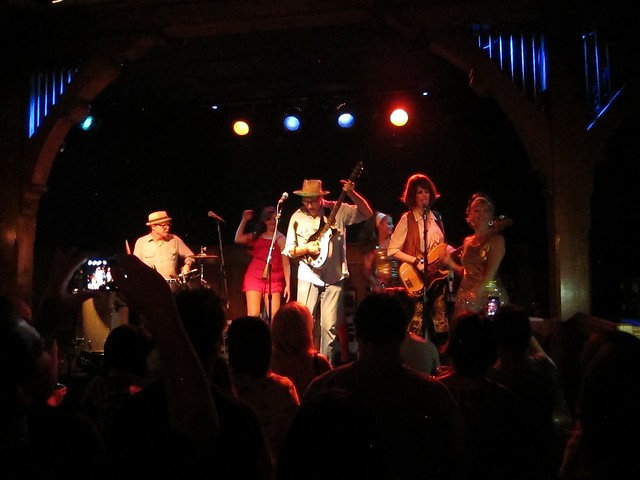
More photos on my Flickr.
4.75/5.0





Fort Collins, CO has a decent music scene and I often make it down to Denver for shows. This time, though, I went a little further afield. My friend, Brent, invited me to Chicago to see Southern Culture on the Skids, and I couldn't say no. In a stroke of brilliant timing, I arrived for possibly the nicest two or three days Chicago has had since before the winter. The days were warm and clear and it was a pleasant evening walk from Brent and Lu's place to Shubas. The venue was relatively small, but SCOTS' enthusiastic fans made it a party evening. Great music, killer weather, and warm hospitality made this a wonderful vacation trip.

Finding the right opening act is always a challenge . Most bands are either thrown together by the venue or they partner up for a tour, but that doesn't always turn out well. Sometimes the problem is that the audience resents anyone that makes them wait for the headliner. Worse, the opener can foster the wrong mood and make it harder on the main act. Southern Culture on the Skids solved that problem handily by bringing in local go-go troupe The Revelettes as their cheerleading squad.

The show started with a pair of dancers shimmying in retro campy style accompanied by pre-recorded music. Then, the remaining three Revelettes tag teamed in for the next song. After a bit of choreographed fun, they got down to business. SCOTS has recently re- recorded their 1994 album "Ditch Digging" and the Revelettes brought up an audience member to help teach us all some dance moves for the title track. The volunteer picked up the steps quickly and soon fell directly into formation with the troupe. She had such a good time that she stayed on stage for the remaining songs.

The fun vibe and enthusiastic dancing made this a perfect warm up for the band and, later, we'd get the chance to prove we remembered the "Ditch Diggin'" steps.

Southern Culture on the Skids had a casual start as bass player Mary Huff and guitarist Rick Miller sauntered out first and picked up their instruments. Huff briefly launched into Lynn Anderson's "(I Never Promised You A) Rose Garden", but it was just a tease before Dave Hartman came on stage on drums and the show officially began with the sharp-edged twang of "Skullbucket". Huff's solid bass vamp gave Miller all the foundation he needed to shred his way through the surf-style instrumental, and the crowd reveled in the bright distortion of his overdriven Silvertone.

As the set progressed, I was struck by the communal feel between the band and their fans. They somehow bridged the relaxed celebration of a Southern pig roast and the congregational fervor of a faith healing service. Even as they tapped into a campy sense of fun, the trio imbued the songs with a respectful intensity. They smoothly flowed from surf to garage rock, chicken-picked pedal tones to thrashy punk rhythms, and bluesy vamps would give way to honkytonk country. The crowd tracked every twist and turn, intimately familiar with the songs, ready to sing along or feel the beat deep in their bones.

SCOTS' playful attitude was at the forefront, with the tongue-in-cheek Southern themes of the lyrics and the band's stage presence and appearance. They pulled out some of their classic audience participation moves: volunteers distributing oatmeal pies from the stage and launching fried chicken into the crowd during "8 Piece Box". It was fun to watch Miller get a mischievous twinkle in his eye before he launched into those songs whose title says it all, like "Liquored Up and Lacquered Down" or "Put Your Teeth Up On the Window Sill". And while his green visored fishing hat and Huff's bouffant wig may have played to some campy stereotypes, they wore them comfortably, with little sense of affectation.

But while we all laughed with them at the silliness and spectacle, it was clear that the band and the fans took this music seriously. Surf numbers like "Meximelt" locked into a psychedelic swirl, driven by Hartman's relentless tribal drum pounding while Miller intently channeled the legendary Dick Dale with a brambled wall of guitar notes. "Papa Was a Preacher, But Mama Was a Go-Go Girl" could have been a one-joke tune, but the honkytonk rhythm cradled Huff's twangy vocal, and it wasn't hard to think that there's a grain of truth in that: SCOTS understands the surety of the preacher, the physicality of the dancer, and the balance to love both equally.

After the show, the band wandered out to sign autographs and chat with the fans, many of whom had seen them the night before in Berwyn. Plenty of performers do the meet-and-greet ritual, but even here SCOTS distinguished themselves. Rather than rush people to clear through the lines, they took the time to connect with each one. They'd humbly deflect the gushing praise and try to have a real conversation.Audience members understood that and waited patiently, knowing they'd get their chance to reminisce about their favorite show or tell the adventure of how they had made it to the venue that night. It was great way to show why, on stage or off, Southern Culture on the Skids are a class act.

More photos on my Flickr.

 It’s a bittersweet pleasure to listen to Uncle Tupelo’s debut album No Depression with 24 years of hindsight. You can hear the band discovering themselves and developing their sound. It’s a snapshot from before the rancor set in. Their label, Rockville Records, hadn’t screwed them yet and the power struggle between Jay Farrar and Jeff Tweedy still lay ahead. Even though the acrimony and split would lead to Farrar’s Son Volt and Tweedy’s Wilco, each of which have made some great music, it’s painful to listen to the band bare themselves in these raw songs and think of what would follow. Their simple sincerity and naïveté made this big impact that the band itself could not outlast and their debut remains fresh and relevant. No Depression captures the beginning of a groundswell that had its roots in the cow punk sounds of X, the Blasters and the Beat Farmers. Tempered by firmer leanings toward folk rock and country, this album has been largely credited with spawning a new genre that never came up with a good enough name; alt-country, Americana or the eponymous “No Depression” have all sat in as labels, but none quite satisfy. Less than a name, it all comes down to the music and attitude.
It’s a bittersweet pleasure to listen to Uncle Tupelo’s debut album No Depression with 24 years of hindsight. You can hear the band discovering themselves and developing their sound. It’s a snapshot from before the rancor set in. Their label, Rockville Records, hadn’t screwed them yet and the power struggle between Jay Farrar and Jeff Tweedy still lay ahead. Even though the acrimony and split would lead to Farrar’s Son Volt and Tweedy’s Wilco, each of which have made some great music, it’s painful to listen to the band bare themselves in these raw songs and think of what would follow. Their simple sincerity and naïveté made this big impact that the band itself could not outlast and their debut remains fresh and relevant. No Depression captures the beginning of a groundswell that had its roots in the cow punk sounds of X, the Blasters and the Beat Farmers. Tempered by firmer leanings toward folk rock and country, this album has been largely credited with spawning a new genre that never came up with a good enough name; alt-country, Americana or the eponymous “No Depression” have all sat in as labels, but none quite satisfy. Less than a name, it all comes down to the music and attitude.